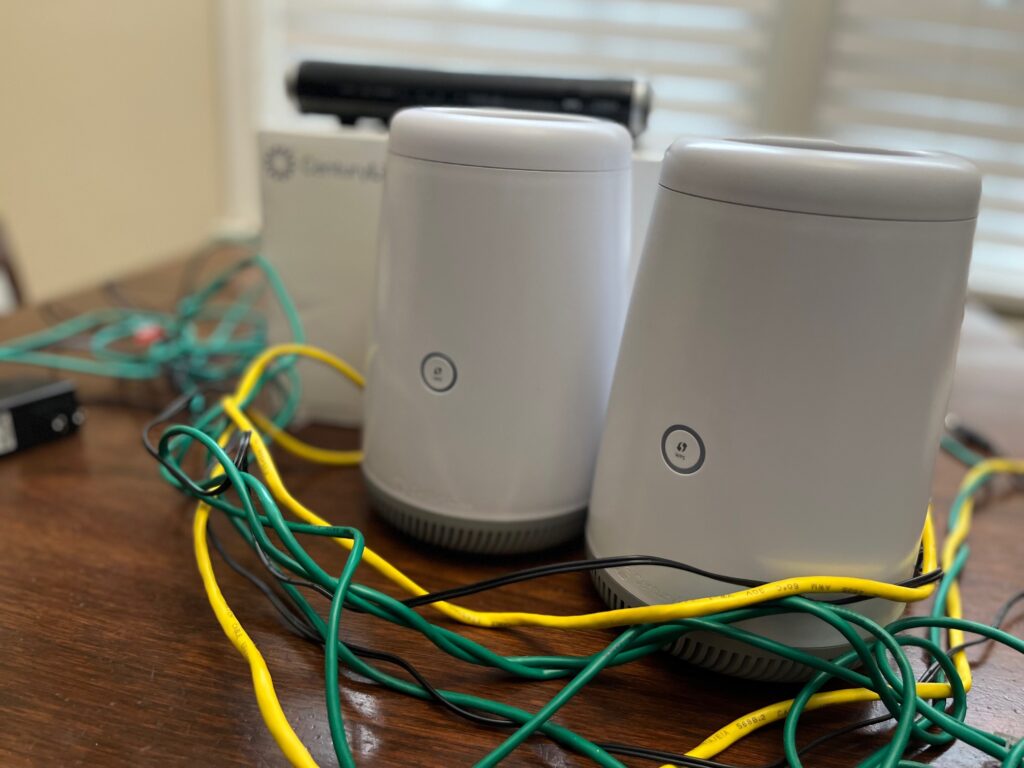What can we do about internet outrages?

Photo by Kathie Obradovich/Iowa Capital Dispatch The answer to better internet does not, as it turns out, require more modems.
While more than 210,000 Iowans were angrily waiting out a massive Mediacom internet outage last week, my home office was in the throes of a three-week outrage with that other provider. You know which one it is, of course, because there are only two choices in most of Des Moines.
When CenturyLink said we had to upgrade to a fiber connection by June 30 or lose service, I of course shopped around to see if we could get a better deal elsewhere for a high-speed connection. It didn’t take long, especially once I learned that Metronet, a new high-speed provider that has moved into some of the suburbs, was not available yet in my neighborhood. (There are also a couple of satellite and cellular providers.)
I set up an appointment with CenturyLink for installation, which led to about three days of house arrest. As everyone knows, you get an eight-hour window for the service call. The installer did not arrive until mid-afternoon two days after the scheduled date. When he left, we had internet service — extremely slow service that was no longer accessible in most of our house.
Then began hours and hours of wait time associated with speaking to a human with the company’s hilariously named “customer service” department. Their main service, it turns out, is putting customers on hold for hours, then transferring them to a dial tone.
One “customer service” suggestion was that we go buy a signal booster, which we never needed before their “upgrade.” Eventually, some “customer service” representative decided we needed a new modem, which we received from a parcel delivery service a few days later.
When that modem didn’t work at all, my husband went through the phone purgatory process again and received a third new modem – and another installation appointment. By now, we have enough modems to start our own internet service, at least for the neighborhood.
The latest modem was never even unpacked. After another week or so of house arrest waiting through more missed appointments, the new service person finally arrived last Tuesday. He said there was nothing wrong with the modem. That’s just what “customer service” tells everyone, he said. In fact, the fiber connection was installed wrong.
Our little nonprofit newsroom does have an office where I theoretically could go get some work done while our internet was down last week at home. I say “theoretically” because the wifi at the office is from Mediacom, which also was down.
I have an internet “hot spot” on my cell phone, so I could still edit and post stories for Iowa Capital Dispatch. I pay a lot for that through a high-end service plan, but it has been a lifesaver. After the derecho storm in August 2020, most of our staff huddled in the office to use my phone’s internet connection. It was like being the only person with a match in one of those survival movies. (You could stream one if you had internet service.)
Still, I understand the primal screams on social media about the Mediacom outage. Internet downtime is extremely costly to businesses and disruptive to everyone else. Everybody hates internet service providers and we all know why. What are our policymakers willing to do about it?
As taxpayers, we are spending hundreds of millions of dollars in Iowa alone for expansion of broadband service to underserved, mostly rural parts of the state. Iowa has awarded $880 million over the past three years for broadband expansion, and more money is coming from the federal government.
Most of us agree that’s important. But the state has not addressed the lack of competition in urban areas, where most of the demand is located. When West Des Moines decided to help Google Fiber get started, the city ended up having to pay Mediacom $600,000 to settle a lawsuit and give the company access to parts of the city-owned fiber network.
The state of Iowa was way ahead of its time in building a government-owned fiber optic network – and taxpayers paid the price for a steep learning curve. For years, lawmakers looked at trying to dump the network, only to learn the state would lose most of its investment in a sale. But the network has since completed a massive, multiyear 100GB upgrade and now provides service not only to state agencies and schools but also public safety agencies and health care providers.
That’s not an answer to Iowa’s consumer needs, however. Most of us would not want government-owned internet even if it were available. Some have suggested regulating broadband providers as a utility, given the public interest in reliable, affordable, secure service. I don’t know if that’s the answer, although it seems worthwhile to have the discussion. Or maybe there’s a way to help and guide cities like West Des Moines whose residents want to foster more competition and choices in service providers.
Given the hundreds of millions of taxpayer dollars going to build out service to sparsely populated areas of the state, maybe lawmakers could spare a few bucks to study what it would take to improve broadband service for everyone.
In the meantime, my new hobby for the near future is packing up and returning excess modems so I don’t get charged for them. “Customer service” will want to send them back out to more people who don’t need them.
——
Kathie Obradovich has been covering Iowa government
and politics for more than 30 years.


